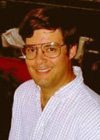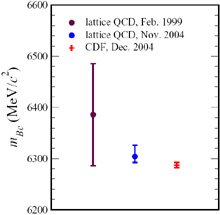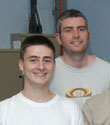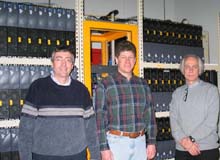 | Wednesday, May 11, 2005 |
|
Wednesday, May 11 THERE WILL BE NO FERMILAB ILC R&D MEETING THIS WEEK THERE WILL BE NO PROTON DRIVER GENERAL MEETING THIS WEEK 3:30 p.m. DIRECTOR'S COFFEE BREAK - 2nd Flr X-Over 4:00 p.m. Fermilab Colloquium - 1 West Speaker: W. Marciano, Brookhaven National Laboratory/ University of Chicago Title: Muon Physics in the 21st Century
Thursday, May 12 |
|
Extended Forecast |
Secon Level 3 |
|
Wednesday, May 11 Italian Wedding with Meatballs Diner Style Patty Melt $4.75 Mediterranean Style Baked Fish $3.75 Beef & Broccoli $3.75 Greek Chicken Panini with Feta Cheese $4.75 Sicilian Style Pizza $2.75 Grilled Chicken Bowtie in a Tomato Cream Sauce $4.75 The Wilson Hall Cafe now accepts Visa, Master Card, Discover and American Express at Cash Register #1.
Wilson Hall Cafe Menu |
| Fermilab Today is online at: http://www.fnal.gov/today/ Send comments and suggestions to today@fnal.gov Fermilab Today archive Fermilab Today PDF Version Fermilab Result of the Week archive Fermilab Safety Tip of the Week archive Linear Collider News archive Fermilab Today classifieds Subscribe/Unsubscribe to |
|
Computer Glitch Yesterday's issue of Fermilab Today was sent out late due to technical problems with Fermilab's listservs. Thanks to the Computing Division, the problem was fixed yesterday morning. Fermilab Today appreciates your patience. |
|
EPP2010 Meeting This Monday UEC Chair William Trischuk recently sent this letter to Fermilab's Users to announce the upcoming EPP2010 meeting. An agenda for the meeting is available online. Dear Fermilab Users, The National Research Council is organizing a decadal study of our field this year. They have formed a committee EPP2010 of 22 members, approximately half from the field of particle physics, and half from outside. The committee has been charged with placing experimental particle physics in the context of the national basic research program, communicating its value and excitement to other scientific
The committee has met twice already. It will meet again at Fermilab on Monday, May 16. At that meeting, the committee hopes to improve its understanding of the international nature of particle physics, both for truly global projects like the International Linear Collider and projects like the Proton Driver. Ian Halliday (PPARC), Yoji Totsuka (KEK) and Albrecht Wagner(DESY) will join Mike Witherell and Pier Oddone in making presentations to the committee. The meeting will also include an open microphone session organized by the APS/DPF Executive. The committee is interested in the opinions of the community both through personal contacts, for example during breaks in the meeting at Fermilab, and from letters. Examples of the questions they have posed so far can be found online. Input received at epp2010@nas.edu will be distributed to the whole committee for discussion. I encourage all members of the Fermilab community to attend the meeting on May 16 and send your opinions to the committee.
William Trischuk |
|
Jack Mateski Retires But
Hopes to Keep Hands In Particle Physics Department's Joseph "Jack" Mateski retires today after nearly 24 years at Fermilab, primarily working with scientists and engineers to design detectors for DZero. "And it is a fun job, I tell you," said Mateski, a broad smile on his face. "I enjoy this kind of work, and wouldn't have stuck around if I didn't. You should enjoy your work." The Joliet, Illinois native worked at Argonne National Laboratory for a number of years before PPD's Donald Tousignant helped him land a job at Fermilab. Mateski is optimistic that his time at Fermilab isn't completely over. "I hope they call me so I can keep my hands in at the lab," said Mateski.
Fermilab has been a family affair for Mateski. All but one of his
four children participated in high school co-op programs and worked
during the summers with their father. Mateski and his wife Kathy
will celebrate their 41st wedding anniversary on May 23.
He plans to relax, work around the house, fish, travel
around the country, and take his grandchildren to area parks.
Every Thursday he and the Fermilab Golf League travel to Phillips
Park in Aurora to play 18 holes. Mateski, who refers to younger,
salt-and-pepper-haired engineers as "kids," will miss the people
at the lab the most. "There are a lot of brilliant people here,"
said Mateski. "I think that we have come up with innovations that
have helped humanity."
|
|
Retiring Igor Churin Bids
'Adieu' to Friends at Lab Igor Churin, a mechanical engineer for the Particle Physics Division, will retire tomorrow after 11 years at Fermilab. Churin emigrated to the United States 18 years ago from the Soviet Union because, he says, "I hated it. It was dead then, rigid and very conformist." Here at Fermilab Churin has had the opportunity to design calorimeters for the Superconducting Supercollider, KTeV, and CMS. Working with three other Russian engineers, Churin designed the CMS calorimeter that has more copper than the Statue of Liberty. In a swords-to-plowshares irony, part of the calorimeter was made at a former nuclear weapons manufacturing site in Russia, and another part was made from old
Churin will miss the open environment of Fermilab, which "includes all the
friends I have made here." He and his wife Anna have been married 38 years.
They have two grown children and three "adorable" grandchildren, who
live next door to their grandparents. Churin will spend his retirement
playing with his grandchildren, but he also has plenty of work to do
around the house when he is not listening to classical music,
taking photographs, traveling (his favorite National Park is the
Boundary Waters in Minnesota), gardening and reading.
|
|
From Science Daily, May 8, 2005 Underground Physics: Searching For Neutrinos In Deep Places A new physics experiment combines thousands of tons of steel plates, a powerful particle accelerator and 450 miles of solid rock to reveal the secrets of a particle that sometimes seems to barely exist. read more |
|
Precise Prediction of Particle Mass, Confirmed by Experiment | ||||
For decades theoretical physicists have tried to compute from first
principles the properties of hadrons, a family of subatomic particles
that includes the proton and neutron. The main obstacle was the
intractable nature of quantum chromodynamics (QCD), the modern theory
of how quarks bind to form hadrons. Now scientists have confirmed the
validity of a new numerical approach, proposed in a recent paper [Phys.
As an application of the new method, a team of physicists from Glasgow University (UK) and Fermilab calculated the mass of a particle called the Bc meson, which consists of a bottom quark and a charmed antiquark. The Bc is a rare particle produced in collider experiments. Until recently, observations gave poor measurements of its mass. In the May 6 issue of Physical Review Letters, the
| ||||
|
Additional Reading: Result of the Week: 26 Theorists + Computer Clusters = Progress in Lattice QCD Result of the Week: CDF Sees Charmed Beauty Meson in a New Decay Mode Result of the Week Archive |
|
Retired - Loren Anderson, AD, 5/11/05 - Patrick Gorak, PPD, 5/11/05 |
|
Optician Not In Today The onsite optician will not be in today.
Retirement Party for Rap and Joanie
Fermilab Barnstormers Meeting Wednesday
International Folk Dancing
Summer Camps at SciTech
|




